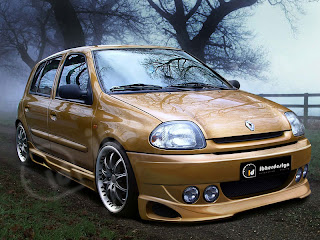Renault Clio V6 - Hot Hatch Madness
By K Anders
The Renault Clio, a run of the mill small hatchback aimed squarely at the mass market. A reliable super mini driven by new drivers, mothers on the school run and old dears popping down to the shops. So what happens when you add an insane body kit, rip out the rear passenger seats and shove a growling 3.0 litre V6 in the back of one these sedate little motors? Well Renault decided to find out in 2001 when they did just that and unleashed the Renault Clio V6 Sport in Europe.
The Clio V6 was superficially based upon the MKII Renault Clio although in reality the two cars share few components. This was quite necessary to transform the standard Clio from a front wheel drive, front engine car typically using a 1.2 or 1.4 litre engine, to a mid engine rear wheel drive hot hatch. The major difference is of course the engine - the 3.0 litre V6 being sourced from the Laguna, Renault's large saloon model, before being heavily tuned to deliver 252bhp.
The most obvious difference to the untrained eye is the Clio V6's looks. You can still see the standard little Clio underneath the body kit if you squint but it's a tough job, the original styling drowning in huge bumpers, air intakes and almost ridiculously wide wheel arches. This is not a subtle car and was not designed to go unnoticed. The design ethos extends to the cars practicality - it's not. With the rear end of the car dominated by the engine, rear passenger seats are gone, the boot is gone, fuel economy is, yes, gone.
Even being as heavily modified as it was, the Clio V6 was not a class leader by any means. Unrefined and very heavy for its humble size, the Clio was little match around a track against the Japanese rivals of the time. And despite the engine, the extra weight meant that much more modest hot hatches could keep up with the Clio V6 in a straight line. Ownership was not a walk in the park either, the Clio V6 having a high price tag, low fuel economy and a high Clio insurance group. This was ultimately beside the point however. In a time of restraint and blandness in the motor industry, the Clio was a breath of fresh air. Quirky, a little bit mad and most importantly - fun.
Article Source: http://EzineArticles.com/?expert=K_Anders The most obvious difference to the untrained eye is the Clio V6's looks. You can still see the standard little Clio underneath the body kit if you squint but it's a tough job, the original styling drowning in huge bumpers, air intakes and almost ridiculously wide wheel arches. This is not a subtle car and was not designed to go unnoticed. The design ethos extends to the cars practicality - it's not. With the rear end of the car dominated by the engine, rear passenger seats are gone, the boot is gone, fuel economy is, yes, gone.
Even being as heavily modified as it was, the Clio V6 was not a class leader by any means. Unrefined and very heavy for its humble size, the Clio was little match around a track against the Japanese rivals of the time. And despite the engine, the extra weight meant that much more modest hot hatches could keep up with the Clio V6 in a straight line. Ownership was not a walk in the park either, the Clio V6 having a high price tag, low fuel economy and a high Clio insurance group. This was ultimately beside the point however. In a time of restraint and blandness in the motor industry, the Clio was a breath of fresh air. Quirky, a little bit mad and most importantly - fun.








































0 comments:
Post a Comment